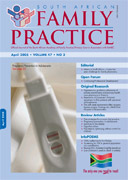Hypertension guideline adherence of private practitioners and primary health care physicians in Pretoria.
Abstract
Background: Hypertension remains a healthcare problem in South Africa. When prescribing evidence-based, cost-effective anti-hypertensive treatment, guideline adherence is essential. The Joint National Committee’s Sixth Report (JNC VI) built its evidence-based review on the outcome of clinical trials. The objective of this study was to assess the hypertension guideline adherence of general practitioners in private practice and of primary health care physicians in an academic government hospital setup in Pretoria, using the JNC VI guidelines. Methods: A survey was conducted on a random sample of 240 general practitioners in Pretoria and on 35 primary health care physicians working in the outpatient departments of the Pretoria Academic, Kalafong and Mamelodi hospitals. Results: The survey showed that private practitioners and primary health care physicians do not follow the JNC VI guidelines when treating hypertensive patients. Physicians in both study populations do not adhere to the guidelines when treating hypertensive patients with isolated systolic hypertension (ISH), previous myocardial infarction (MI) and renal disease. Even so, most doctors correctly prescribe angiotensin-converting enzyme (ACE) inhibitors when treating congestive cardiac failure (CCF) and diabetic nephropathy. Conclusions: This study indicates the need to educate physicians in both private and public setup regarding the value of prescribing cost-effective anti-hypertensive medication, based on evidence from clinical trials. (SA Fam Pract 2005;47(3): 51-54)
Published
2005-04-01
Section
Original Research
By submitting manuscripts to SAFP, authors of original articles are assigning copyright to the South African Academy of Family Physicians. Copyright of review articles are assigned to the Publisher, Medpharm Publications (Pty) Ltd, unless otherwise specified. Authors may use their own work after publication without written permission, provided they acknowledge the original source. Individuals and academic institutions may freely copy and distribute articles published in SAFP for educational and research purposes without obtaining permission.

